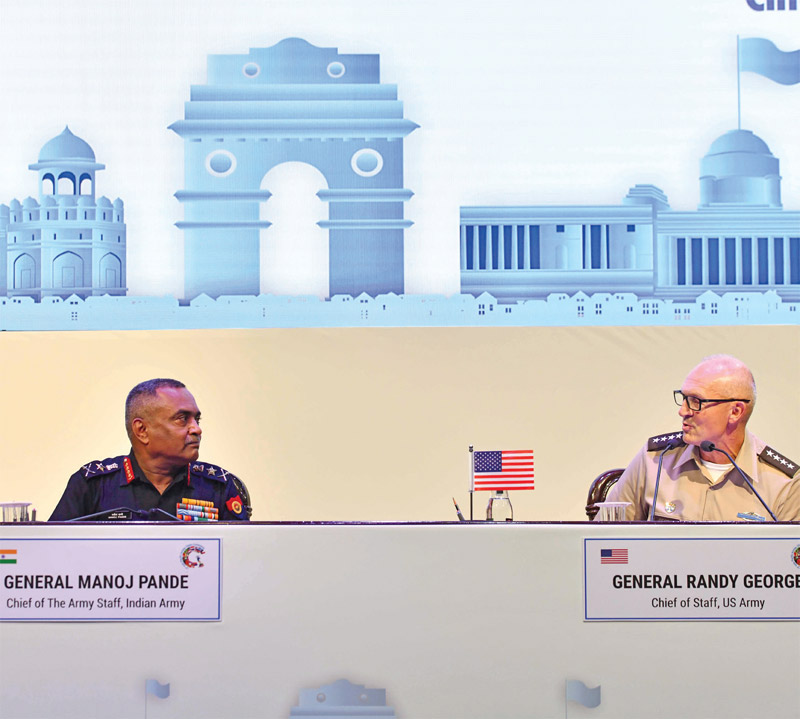The curious anxiety of the Indian army chief about the Indo-Pacific
Subhashis Mittra
New Delhi hosted the 13th Indo-Pacific Armies Chiefs’ Conference (IPACC) against the backdrop of China’s growing military assertiveness in the Indo-Pacific as well as India’s border row in eastern Ladakh.

Military delegates from around 35 countries attended the meeting on September 26-27, reflecting the geopolitical significance and geoeconomic weight of the Indo-Pacific nations, which account for 65 per cent of the world’s population, 63 per cent of the global GDP and 50 per cent of the world’s maritime trade.
The region’s share in the global GDP, its share in merchandise market and maritime trade undeniably lends this region a pivotal stature in charting the world’s course in the 21st century. Chief of Staff of the US Army General Randy George and several chiefs of armies were among the notable delegates at the two-day conference. The IPACC, instituted as a biennial event in 1999, is attended by army chiefs of countries of the Indo-Pacific region to discuss issues of mutual interest. The US Army was the co-host of the conference where India showcased some of its indigenously-developed military platforms at an exhibition organised as part of the event.
The conference discussed issues of mutual interest in the region and the role of military diplomacy in mitigating any crisis in the region. Two other conferences—the Indo-Pacific Armies Management Seminar (IPAMS), and Senior Enlisted Leaders Forum (SELF)—were held separately at the Manekshaw Centre in New Delhi to explore multilateral security partnership in the region.
Addressing the IPACC, defence minister Rajnath Singh called for collective efforts to deal with the complexities of the Indo-Pacific and ensure a future marked by prosperity, security and inclusivity in the region. Amid growing global concerns over China’s aggressive military behaviour in the Indo-Pacific, Singh pointed out that states must recognise that global issues involve multiple stakeholders and no one country can address these challenges in isolation.
The defence minister emphasised that the Indo-Pacific was no more a maritime construct but a full-fledged geo-strategic construct and the region was facing a complex web of security challenges, including boundary disputes and piracy.
Flagging concerns over the region facing a complex web of security challenges, including boundary disputes, Singh called for concerted efforts by like-minded nations to realise the shared vision for a free, open, inclusive and rules-based Indo-Pacific. “Our efforts to build robust military partnerships with friendly countries underscore our commitment to safeguard national interests and address global challenges,” he said.
In his remarks, Indian Army Chief General Manoj Pande said the Indo-Pacific had emerged as a “pivotal theatre” in the contemporary geo-strategic canvas and that India’s outlook for the region emphasises respect for sovereignty and territorial integrity of all states as well as peaceful resolution of disputes.
“While efforts by countries are converging towards effecting a free and stable Indo-Pacific, yet we are witnessing manifestations of inter-state contestations and competitions,” General Pande said. “India’s strategic location, astride the vital sea lanes of communication, in the Indo-Pacific, propels us as a key player in the region’s discourse,” he said, adding, “The challenges we face transcend across borders and our response to them must factor this. The Indo-Pacific region is not merely a collection of nations—it is a web of interdependencies. We are bound by geography, and our destinies are intertwined. The security and prosperity of one nation is intrinsically linked to the security and prosperity of its neighbours, and much beyond. Therefore, each one of us has an important and a pivotal role to play.”
In an obvious reference to China, General Pande said apart from challenges in the maritime domain, the Indo-Pacific also faced a wide range of security and humanitarian concerns on land as well, including “artificially expanded islands to acquire real estate and establish military bases.”
This came against the backdrop of China steadily basing anti-ship and anti-aircraft missiles, fighters and other military hardware on islands it has built in the South China Sea, where it is locked in territorial disputes with its neighbours.
The US Army chief General George said the partnership between the US and Indian Army is crucial for stability in the Indo-Pacific, noting the region was facing a challenging strategic environment.
Canada’s deputy army chief Maj Gen. Peter Scott said the ongoing diplomatic row between India and Canada was not going to adversely impact bilateral defence ties after relations plunged to an all-time low following Ottawa’s allegations against New Delhi over the killing of Hardeep Singh Nijjar in British Columbia in June.
Maj Gen. Scott was of the view that the matter should be resolved at the political level and should not have a bearing on India-Canada military cooperation. The Canadian army commander’s trip to New Delhi was the first high-level visit from Canada to India after the diplomatic row broke out following Canadian Prime Minister Justin Trudeau’s remarks in the House of Commons.
Also read: Terrorism on the Table

